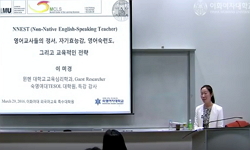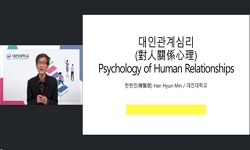본 연구는 구성주의에 기초한 유아동작교육이 유아의 자기조절능력과 자기효능감에 미치는 효과를 검증하는데 그 목적이 있다. 연구대상은 대구시의 두 유치원에 재원중인 만 6세 유아 80명...
http://chineseinput.net/에서 pinyin(병음)방식으로 중국어를 변환할 수 있습니다.
변환된 중국어를 복사하여 사용하시면 됩니다.
- 中文 을 입력하시려면 zhongwen을 입력하시고 space를누르시면됩니다.
- 北京 을 입력하시려면 beijing을 입력하시고 space를 누르시면 됩니다.
https://www.riss.kr/link?id=T11598812
- 저자
-
발행사항
대구 : 계명대학교 교육대학원, 2009
-
학위논문사항
학위논문(석사) -- 계명대학교 교육대학원 , 유아교육전공 , 2009. 2
-
발행연도
2009
-
작성언어
한국어
- 주제어
-
발행국(도시)
대구
-
기타서명
(The) Effects of Young Children's Movement Education based on Constructivism On Self-Control Ability or Self-Efficacy
-
형태사항
ⅳ, 105 p. : 삽도, 사진 ; 26 cm.
-
일반주기명
계명대학교 논문은 저작권에 의해 보호받습니다.
지도교수 : 성소영
부록 : 유아동작교육 계획안(p. 74-101)
참고문헌 : p. 65-73 - 소장기관
-
0
상세조회 -
0
다운로드
부가정보
국문 초록 (Abstract)
본 연구는 구성주의에 기초한 유아동작교육이 유아의 자기조절능력과 자기효능감에 미치는 효과를 검증하는데 그 목적이 있다. 연구대상은 대구시의 두 유치원에 재원중인 만 6세 유아 80명으로 구성되었다. 실험집단과 통제집단은 각 40명씩 다른 유치원의 유아들로 구성하였다. 실험집단은 구성주의에 기초한 유아동작교육프로그램을 15주간 15회 실시하였고, 비교집단은 전통적 유아체육교육프로그램을 실시하였다. 프로그램 실시 전후에 유아의 자기조절능력 검사는 체크리스트를 통해, 자기효능감 검사는 개별면접 방법으로 실시하여 기록·채점하였다. 구성주의 교수법에 의한 유아동작교육이 자기조절능력 및 자기효능감에 미치는 영향을 알아보기 위해 자료 분석에는 공분산분석(ANCOVA)을 사용하였다.
본 연구의 결과는 다음과 같다. 첫째, 구성주의에 기초한 유아동작교육은 자기조절능력(자기통제, 주의집중, 충동성감소)에서 주의집중을 제외한 모든 영역에서 긍정적인 효과가 나타났다. 둘째, 구성주의에 기초한 유아동작교육은 자기효능감(인지적 자기효능감, 사회ㆍ정서적 자기효능감, 신체적 자기효능감)에서 긍정적인 효과가 나타났다. 따라서 구성주의 교수법에 의한 유아동작교육은 자기조절능력 및 자기효능감을 향상시키는 활동으로 활용 가능함을 시사한다.
다국어 초록 (Multilingual Abstract)
The purpose of this study is to verify the effects of young children's movement education based on constructivism on children's self-control ability and self-efficacy. 80 6-year-old children in two kindergartens in Daegu were selected as the subject o...
The purpose of this study is to verify the effects of young children's movement education based on constructivism on children's self-control ability and self-efficacy. 80 6-year-old children in two kindergartens in Daegu were selected as the subject of this study. Each experimental and control group consists of 40 different children from the two kindergartens.
The members of the experimental group were trained through the young children's movement education program based on constructivism teaching method 15 times for 15 weeks, and the members of the control group did as traditional methods young children's physical education program. Before and after operating this activities, children's self-control test by checklists and self-efficacy test through individual interviews were done, and both tests were recorded and graded. To investigate the effect of young children's movement education based on constructivism on self-control ability and self-efficacy, the data were analyzed by Analysis of Covariance Analysis (ANCOVA).
The research results are in the followings:
First, young children's movement education based on constructivism has positive effect on the self-control ability areas (self-control, paying concentrated attention & reduction of impulsiveness) except for paying concentrated attention.
Second, young children's movement education based on constructivism has positive effect on self-efficacy (cognitive self-efficacy, social and mental self-efficacy, physical self-efficacy).
In conclusion, the above results indicate that young children's movement education based on constructivism can be used as an activity to improve self-control ability and self-efficacy.
목차 (Table of Contents)
- Ⅰ. 서론 = 1
- 1. 연구의 필요성 및 목적 = 1
- 2. 연구문제 = 6
- 3. 용어의 정의 = 6
- Ⅱ. 이론적 배경 = 9
- Ⅰ. 서론 = 1
- 1. 연구의 필요성 및 목적 = 1
- 2. 연구문제 = 6
- 3. 용어의 정의 = 6
- Ⅱ. 이론적 배경 = 9
- 1. 구성주의 = 9
- 2. 유아동작교육 = 14
- 3. 구성주의에 기초한 유아동작교육 = 26
- 4. 자기조절능력 = 29
- 5. 자기효능감 = 35
- 6. 유아의 자기조절능력과 자기효능감 = 39
- Ⅲ. 연구방법 = 41
- 1. 연구대상 = 41
- 2. 연구도구 = 41
- 3. 연구절차 = 43
- 4. 자료처리 = 49
- Ⅳ. 연구결과 = 50
- 1. 유아동작교육이 자기조절능력에 미치는 영향 = 50
- 2. 유아동작교육이 자기효능감에 미치는 영향 = 54
- Ⅴ. 논의 = 58
- 참고문헌 = 65
- 부록 = 74
- (Abstract) = 102
- (초록) = 104













